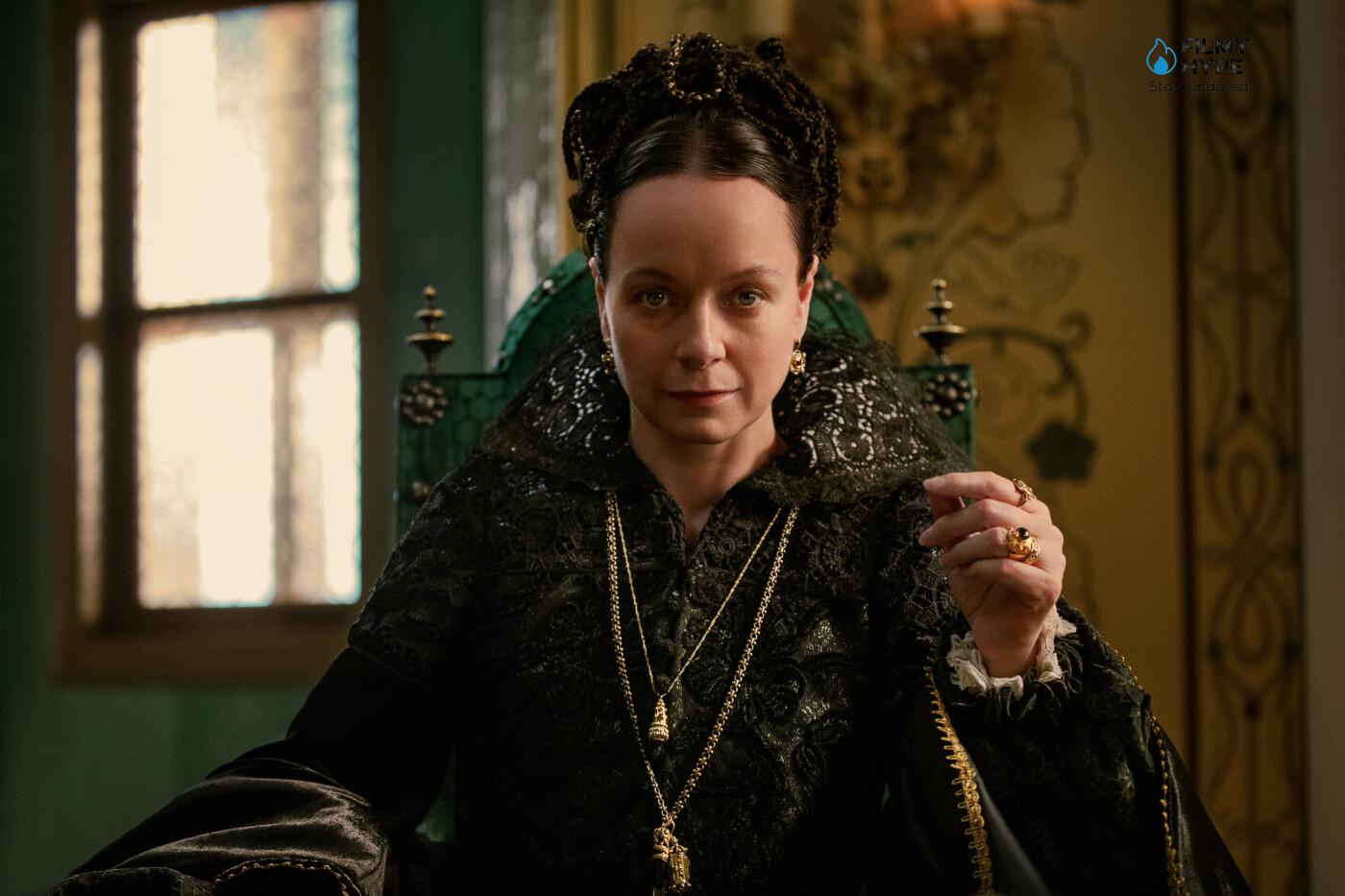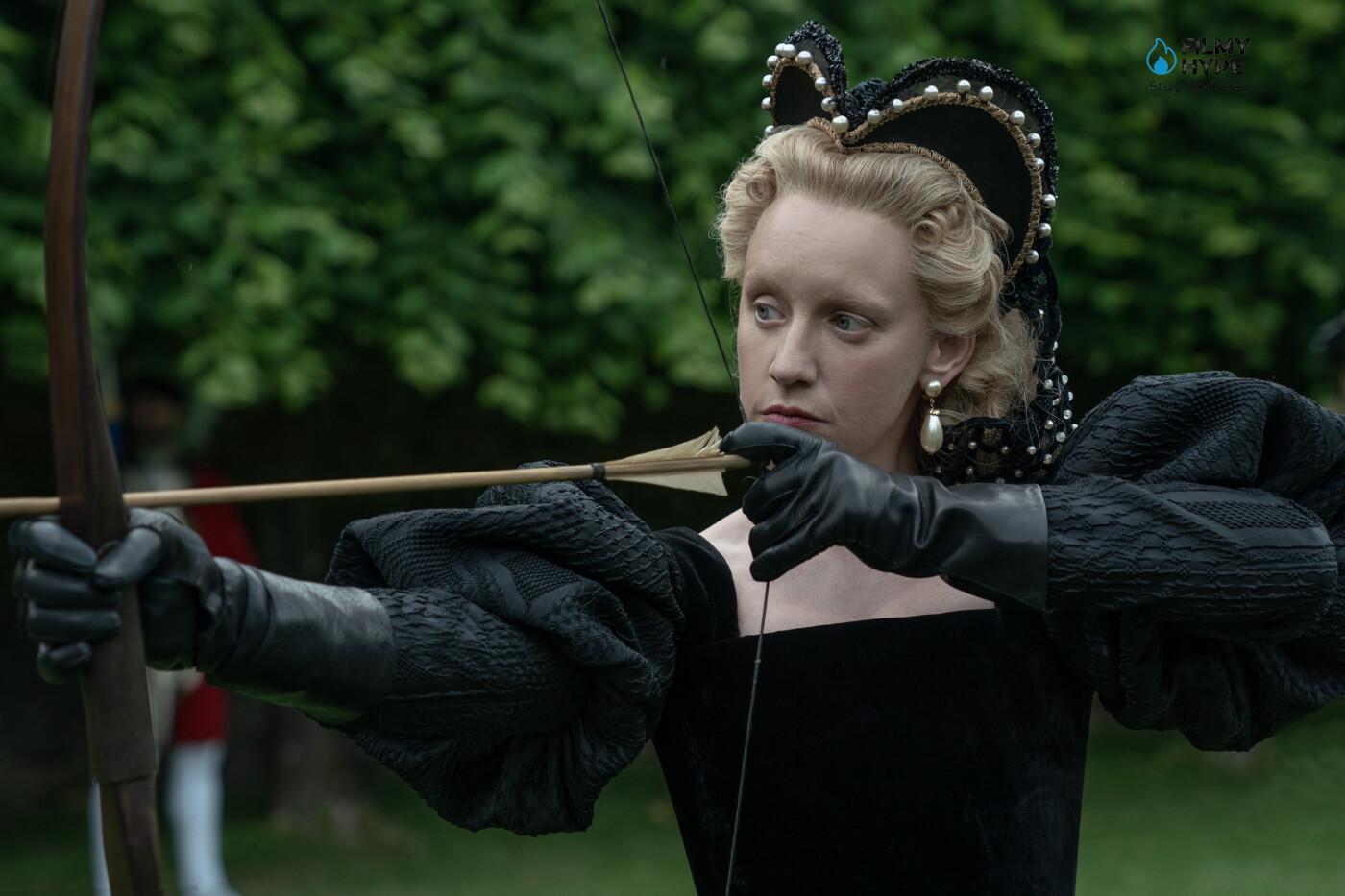The Serpent Queen Review: The Lively Period Drama That Plays With History | StarzPlay
Stars: Samantha Morton, Amrita Acharia, Barry Atsma
Created By: Justin Haythe
Streaming Platform: StarzPlay
Filmyhype.com Ratings: 3.5/5 (three and a half star)
The Serpent Queen is the new international period drama TV series by STARZ and STARZPLAY, created by Justin Haythe and based on the book by Leonie Frieda Catherine de Medici: Renaissance Queen of France. The series debuts on STARZPLAY on Sunday 11 September 2022 with an episode, the release will be weekly for the next 8 episodes. Samantha Morton plays Queen Catherine de ‘Medici, given in marriage by Pope Clement VII to the second son of Francis I of France, Henry. She was Queen consort, mother of three Kings Francis II, Charles IX and Henry III had the role of regent for the last two as the children were too young to reign independently, after the death of Henry II and their first son Francesco II, married to Maria Stuart. The series consists of 8 episodes, it is not presented as a miniseries even if everything suggests that it is built as such.

The Serpent Queen Review: The Story
The Serpent Queen reinterprets the story of Caterina de’Medici and her reign. Catherine herself tells her young servant, Rahima, her story starting from when a fourteen year old orphan, raised in a convent of nuns, is taken to court by Pope Clement VII who offers her in marriage to the second son of the King of France. A political alliance that would also have brought a rich dowry to the King. Immediately after the marriage, Catherine discovers that her husband Henry has a predilection for Diana de Poitiers, a widow who is twice her age and is also a distant cousin of Catherine.
When Clemente died, the situation at court for Caterina became more and more dangerous. Her husband does not love her, she cannot have children, and it seems an unnecessary burden for the court. But with her sagacity and political intelligence, he will be able to enter the King’s good graces, managing to save her position, without however getting rid of Madame de Poitiers who also influenced her children. Cunning was her best weapon and after Henry’s death, Catherine will have to find a way to assert her position, despite the religious influence of Maria Stuart, a fervent Catholic, wife of Francis II, the first child of Catherine with health frail.
The Serpent Queen soon divides both on a thematic and narrative level, and from an actor’s point of view: the first episodes focus on the figure of Catherine as a young man, torn from the Italian context by her uncle, Pope Clement VII, who organizes the arranged marriage between his niece and the future king of France, who Catherine soon discovers he is in love with a much older woman. Liv Hill leaves the baton to Samantha Morton (who in the incipit acts as a retrospective narrator of her own story), to re-credit the figure of the great queen through a tenuous, never too excited acting, weighted in the respectful formalist paintings that enclose Catherine in a cage audiovisual. The representation of a ruthless woman, a portrait of an ambiguous and ambivalent figure, with blurred outlines that overlap with the fragility of a strong sovereign, determined in her positions, is coated with a formally and aesthetically perfect staging, resorting to a scenographic positioning and meditated and transcendental actor.
The Serpent Queen Review and Analysis
From the title the objective of the series is evident: The Serpent Queen wants to tell the most ruthless, ambiguous side of Caterina de ‘Medici, supporting a part of the historiography of a sovereign with a bulky personality. And this is the prevailing aspect of a whole series that tries to move away from the classic period drama looking for a more modern approach in language and style but never pushing too hard. Modernity ends up out of tune with the story of the past which translates into the riff of the theme song, excess of blood and some somewhat provocative and thrusting scenes. Too little to be truly innovative.
The breaking of the fourth wall with the protagonist who looks into the camera to explain her moves to the spectators is becoming a tool that is too abused after House of Cards (and if you are not Frank Underwood it can also be avoided). All of these aspects are the trappings of a series that has a powerful story behind it. The story of Caterina de ‘Medici is rich and fascinating. A girl used for political purposes, alone in a foreign court who made fun of the Italians, capable of standing up to generate three kings, of becoming regent and de facto leader of the nation. A climb that is the result of great intelligence and culture that at times seems reduced a bit too much to strategic maneuvers, to “magical” forms that almost seem to debase the cultural value of Caterina.
The series fully responds to STARZ’s need to present productions with strong and charismatic female characters who overshadow men. It is a perfectly successful operation that fascinates, and intrigues, also thank to the skill of its protagonists. Liv Hill is a surprising young Catherine, a girl catapulted into a world she does not know but who immediately demonstrates all her talents, capable of absorbing all the blows that come to her, from insults to her physical appearance to those of hers for her origins. But after all, she is a woman of the 1500s, her only function was to procreate and satisfy the wishes of men, as the other women of the court demonstrate. The hard rind emerges thanks to Samantha Morton, icy and seraphic in the contemporary part, and more emotional in the more adult flashbacks.

The camera follows Caterina, to then scrutinize her impassive face, as enigmatic as it is revealing: the close-ups are enhanced by many unbalanced shots, in which the human figure is central to the remaining profile, sadly illuminated by saturated shades, and by a central focus, not contemplating any depth of field. Caterina is imposing and austere in her glimpses, in those contre-plongeé drawn on her slender figure as a small woman, but never small. A narrative and linguistic-formal expedient dissonant concerning the historical and political context of the series, but it seems to be functional to the suggestive representation of the queen of snakes: the look in the car is charged with an even more irreverent value when the protagonist – both when she is played by Liv Hill who by Samantha Morton – speaks to the viewer, breaking the sacredness of the fourth wall represented by the screen.
While this implies a decisive severance from the classic canons of period drama, in which it is even more necessary to maintain a narrative detachment due to a temporal distance of the diegetic fact, on the other hand a direct dialogue is necessary with those who must be made aware of Catherine’s true nature. The protagonist wants the viewer to enter into direct communion with her, that through an act of empathy he can understand that “she is not bad, they draw her like this”. And here the veil represented by the objective dissolves, and the viewer awakens from his sleep of filmic identification, to realize that he is watching a scenic and fictional representation of a story that has been told for too long inaccurately and unfairly compared to a woman, Caterina de ‘Medici, portrayed as a snake, but simply a queen who did not have the youth of a princess.
The Serpent Queen Review: The Last Words
A strong woman, capable of building her fortunes, Caterina de ‘Medici has a contemporary spirit in an ancient world. The series plays with the legend around the merciless ferocity of a woman queen consort, regent, and queen mother. Watching the 8 episodes of The Serpent Queen the impression is of being in front of a finished story, especially for how the narration has developed. Without making spoilers if not related to reality, the series ends with the coronation of his second son Charles IX, of which he is regent until he comes of age. The reign of Caterina de’Medici is therefore still very long but to develop subsequent seasons a profound change in the narrative construction would be necessary, based on the flashbacks and the story of Caterina herself.







